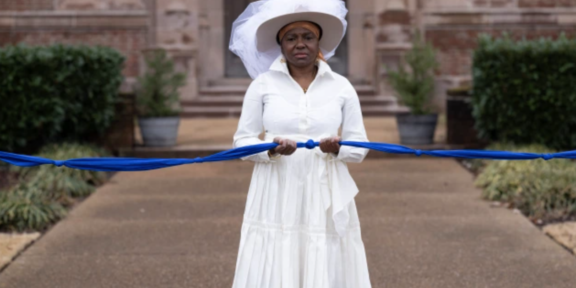Anxious whispers from the audience transformed into dead silence as the softly lit auditorium turned pitch black. All of the sudden, search lights beamed on the lower level of North Carolina A&T’s Harrison Auditorium. A group of terrified boys ripped through the balcony — panting, stumbling, yelling at each other to keep moving. A snowstorm was brewing in Greensboro that night, but the only thing on students’ minds was why those boys were running.
As the boys disappeared then reappeared on the lower level of the packed auditorium, viewers on the balcony edged over the railing, straining their necks to find out why those boys were running so hysterically … as if their lives were at stake. The audience would later find out their lives were in danger, and the youngest of the four would not live to see daylight again.
“Mississippi Mourning: The Emmett Till Story” brings to life the murder of 14-year-old Emmett Till who was accused of whistling at a white woman. Writer and director Kevin Wilson Jr. wrote “Mississippi Mourningî for a high school project when he was only 14. He felt Till’s story was a historically significant event that has been hidden.
“I think that Emmett Till’s case was the catalyst that started the Civil Rights Movement,” the young playwright said. “But many people don’t like to talk about it. They omit it from the history books, although it is one of the bigger moments in our history.”
Wilson’s mother taught him the harsh reality of life in the segregated South when he was a young boy growing up in Durham, N.C.
“My mother made me, forced me to watch documentaries,” he recalled. “At age five or six, looking at pictures of Emmett Till, that can be a very emotional experience to see a young guy mutilated. But she forced that into me and it stuck with me over the years.”
Now a junior majoring in journalism and mass communication at North Carolina A&T, Wilson uses the stage to try and teach his audience — just as his mother taught him. Through “Mississippi Mourning,” he wants to show his audience that the atrocities taking place in the play still go on today.
“A year ago, there was a guy who was hanged by the Ku Klux Klan,” Wilson said. “And that goes to show you that this stuff is not over. It’s just covered up. People make the mistake of saying, ‘Well that’s the past. That’s history.’ No, this is now.”
Wilson and the rest of the cast were subjected to racism, because of the racially charged production. After one rehearsal, he discovered a note on his car that read “Keep Civil Rights Out of God’s Country.”
“It was hurtful, but it wasn’t unexpected,” he explained. “This is Greensboro. People who live in Greensboro know that Greensboro is one of the most racist cities in North Carolina.”
And it didn’t stop there. Death threats and other threatening messages were sent to the cast via the Internet. Security was increased for rehearsals to protect the students. Wilson had to make a tough decision.
“I had to talk to my cast and let them know: ‘This is what we’re going to go through.This is what we have to deal with,'” Wilson said. “And I gave them the option of leaving.”
Even though the threats were hard for Wilson, the young playwright said he and his cast grew from the experience. They were not deterred and the show went on.
Despite the inclement weather, the Jan. 29 performance was sold out.
Dr. Benjamin F. Chavis, president of Hip-Hop Summit Action Network, said he was encouraged to see the tremendous effort put into bringing the story alive.
“It took a lot of talent to write this play,” Chavis said. “All of the actors and actresses were just excellent. Each generation has to rise to the occasion. I’m very proud of today’s student.”
For many students, seeing the play was an emotional experience. Latisha Price, junior psychology major at A&T, said seeing the Emmett Till story was hard to sit through.
“I had to get up and leave,” Price said. “Just knowing they did all of those things to a 14-year-old boy who didn’t know what was going on or his surroundings. They were so heartless.”
Tony Partridge, who played Emmett Till, considered it a blessing to play the lead role. Partridge said he strived to understand his character so the audience could understand Till’s experience.
“It’s almost as if I want Emmett Till to speak though me, to feel his soul come out to the people through me so everybody can know what it feels like,” Partridge said.
Greensboro is not the last stop for “Mississippi Mourning.” The crew will perform in Durham, N.C., and New York as well. Wilson hopes the production will encourage conversations — conversations that will spark change.
“We don’t like to talk about it, because it is such a stain on the fabric of our society,” he said of the Emmett Till case. “It won’t be until we stop looking the other way as Americans that we will see a change.”




